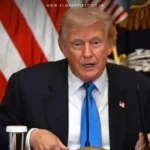
In a crucial move to curb Russia’s profits from its oil exports amidst the ongoing Ukraine conflict, senior US treasury officials are visiting India to emphasize the importance of adhering to the oil price cap agreement. Acting Assistant Secretary for Terrorist Financing Anna Morris and PDO Assistant Secretary for Economic Policy Eric Van Nostrand are scheduled for meetings in New Delhi and Mumbai with both government and private sector representatives. The discussions aim to bolster cooperation on anti-money laundering, counter-terrorism financing, and illicit finance issues, as well as to ensure the continued implementation of the price cap policy.
Implemented by the G7 nations, the European Union, and Australia following Russia’s invasion of Ukraine in February 2022, the price cap restricts the use of Western maritime services for transporting Russian oil that is priced at or above USD 60 per barrel. This measure seeks to limit the financial resources available to Russia for its military actions against Ukraine while maintaining global energy market stability.
India, which has forged strong economic and defense relations with Russia and has become its top oil supplier in 2023, finds itself in a delicate position. While the country has maintained a stance of neutrality regarding the conflict, the visit by US officials underscores the international pressure to align with the global strategy to penalize Russia economically without destabilizing the energy markets.
Morris and Nostrand are expected to shed light on the efficacy and objectives of the price cap during a session hosted by the Ananta Aspen Centre in New Delhi. According to their recent blog post, the price cap has successfully limited Russia’s oil revenue without causing disruption to the energy market. Notably, the discount on Russian oil has increased significantly, a development attributed to the rigorous enforcement of the price cap, signaling its impact on Russia’s economy.
The US Treasury’s statement highlights the dual benefits of the price cap: it not only reduces Russia’s profits from oil sales but also ensures a steady energy supply to global consumers, including India. This approach offers countries like India greater bargaining power in their oil transactions with Russia, contributing to both global economic stability and the diplomatic effort to address the Ukraine crisis.









































Leave a Reply